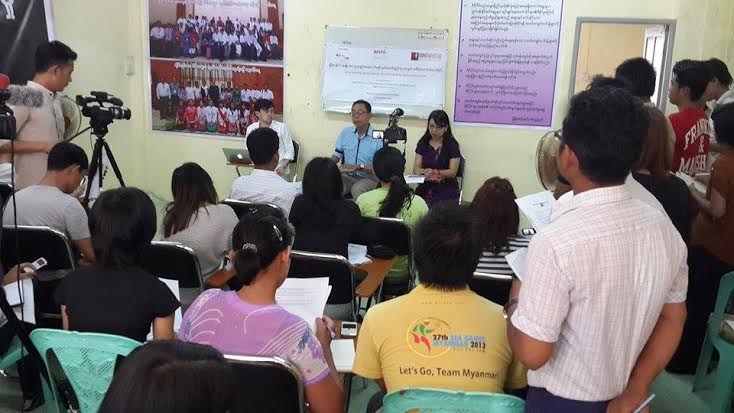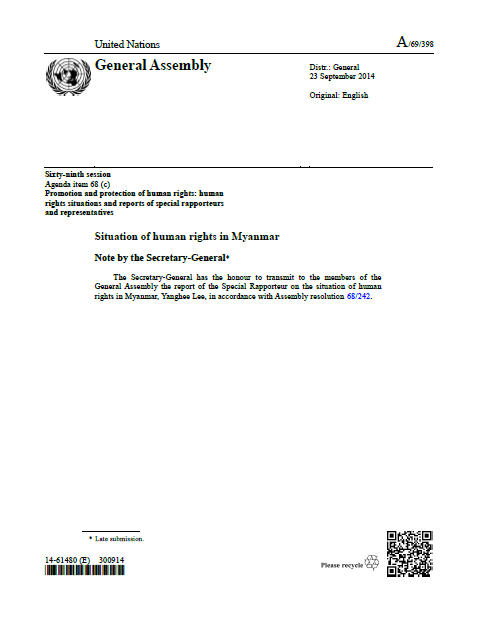Posts Tagged ‘Sexual Violence’ (115 found)
Myanmar 2014: Civic Knowledge and Values in a Changing Society
 After decades of military rule and isolation, a new Asia Foundation survey shows Myanmar’s citizens are hopeful about the future – on elections, respondents say they believe in exercising their right to vote: 77 percent say that voting can lead to improvements in the future, just 10 percent say things will not change no matter how one votes. But this optimism is tempered by challenges that remain. The findings reveal limited knowledge among the public about government institutions and their functions, low level of social trust, a high degree of political polarization, and deep apprehension about economic opportunities.
After decades of military rule and isolation, a new Asia Foundation survey shows Myanmar’s citizens are hopeful about the future – on elections, respondents say they believe in exercising their right to vote: 77 percent say that voting can lead to improvements in the future, just 10 percent say things will not change no matter how one votes. But this optimism is tempered by challenges that remain. The findings reveal limited knowledge among the public about government institutions and their functions, low level of social trust, a high degree of political polarization, and deep apprehension about economic opportunities.
Burmese Government Urged to Investigate the Enforced Disappearance of Sumlut Roi Ja
On the third anniversary of the abduction of Sumlut Roi Ja, an ethnic Kachin woman from Burma, we, the undersigned organizations, call on the Burmese government to thoroughly investigate her enforced disappearance and hold the perpetrators accountable […]
• • •Joint Statement of Karen Women’s Groups in Support of the Reunification of the Kawthoolei Armed Forces (KAF)
The Karen Women’s Organization (KWO), Karen Women’s Empowerment Group (KWEG) and Karen Women’s Union (KWU) welcome the announcement, on October 13th, 2014, of the Karen armed resistance groups coming together under the name of “Kawthoolei Armed Forces (KAF)”. The alliance of 4 Karen armed forces meets the long held desire of Karen people everywhere, especially of Karen women. We believe this is an opportunity for both peace building, and improved co-operation which can help reduce violence against women […]
• • •Statement: Civil Societies’ Review on Myanmar’s Transition Process: Prospects for 2015 and Beyond
We, more than 650 representatives from 257 organizations and networks in Myanmar, came together in Yangon for 3 days from 14-16 October 2014 to exchange opinions, debate and to assess a wide range of issues currently confronting Myanmar in the context of recent political developments and the transition process that started in 2011 […]
• • •69th Session of the UN General Assembly – Situation of human rights in Myanmar: Report of the Special Rapporteur on the situation of human rights in Myanmar
I. The mandate of the Special Rapporteur on the situation of human rights in Myanmar was established pursuant to Commission on Human Rights resolution 1992/58 and recently extended by Human Rights Council resolution 25/26. The present report is submitted pursuant to Council resolution 25/26 and General Assembly resolution 68/242.
II. Background
2. Following the completion of the term of the previous mandate holder, the current mandate holder took up her functions only in June 2014, which resulted in a shorter period than usual to conduct a country visit and review the information gathered. The present report therefore sets out the Special Rapporteur’s preliminary observations, to be supplemented by her oral statement to the General Assembly […]
• • •The Myanmar National Human Rights Commission Continues Failing to Deliver
 A report authored by Burma Partnership and Equality Myanmar was launched on 25 September 2014 in Rangoon revealing the continuing ineffectiveness of the Myanmar National Human Rights Commission (MNHRC) as well as the lack of independence from the government. The report was launched on the same day that a reshuffle of the members of MNHRC was announced by the government, which came as a complete surprise to civil society organizations due to the lack of consultation.
A report authored by Burma Partnership and Equality Myanmar was launched on 25 September 2014 in Rangoon revealing the continuing ineffectiveness of the Myanmar National Human Rights Commission (MNHRC) as well as the lack of independence from the government. The report was launched on the same day that a reshuffle of the members of MNHRC was announced by the government, which came as a complete surprise to civil society organizations due to the lack of consultation.
Released at the Myanmar Journalists Network in Rangoon, Burma: All the President’s Men, contributed to the annual Asian NGO Network on National Human Rights Institutions (ANNI) Report on the Performance and Establishment of National Human Rights Institutions in Asia (2014). The report analyzes the Myanmar National Human Rights Commission Law 2014 enacted in March this year (enabling law) that institutionalizes the mandate of the MNHRC. The report finds that the law does not guarantee independence from the government and in particular, the president’s office. In contravention of international standards on national human rights institutions, namely the Paris Principles, the selection process does not adequately consult with civil society. As the report points out, “It is up to the selection board to come up with procedures for short-listing candidates, yet the enabling law itself should set out the process/procedure for selection, with consultations with civil society.” The members of the MNHRC are actually chosen by a selection board of ten, five of which are from the government or are government-affiliated. The enabling law states that two members of this board are to come from civil society organizations and a further two are to be MP, yet there is no transparency regarding the procedures under which the two MPs are chosen. Additionally, the chosen civil society members to the selection board are restricted to registered civil society only, thus excluding many outspoken and critical political and human rights groups who feel they cannot register under the current climate […]
• • •Myanmar/Burma: Sustained EU Engagement at UN Critical to Support Human Rights Reforms
Amnesty International, FIDH (the International Federation for Human Rights), and its member organization, the Alternative ASEAN Network on Burma (ALTSEAN-Burma) today call on the European Union (EU) and its member states to ensure continued international engagement on the human rights situation in Burma by again introducing a resolution on the country at the upcoming United Nations General Assembly (UNGA) in October 2014. A failure to retain a robust UNGA resolution on Burma would endanger progress on human rights, which has increasingly come under threat this year […]
• • •Burma: Eight Chin Activists Convicted; Fined
[Chiang Mai, Thailand] On Wednesday 23 July eight Chin activists – charged under article 18 of “The Right to Peaceful Assembly and Peaceful Procession Act” with protesting without permission – were convicted in Matupi township court under presiding Judge Aung Mya, and ordered to pay fines of 30,000 kyats each the same day […]
• • •Burma: Drop Charges against Chin Activists; End Impunity for Sexual Violence
[Chiang Mai, Thailand] The Chin Human Rights Organization (CHRO) today condemned the Government of Burma for pursuing legal proceedings against 8 Chin activists who demonstrated
against sexual violence perpetrated by Burma Army soldiers, and failing to deliver justice for Chin victims of sexual violence. CHRO urged the Burmese authorities to immediately and unconditionally drop the charges against the activists, and reiterated its long-standing call for an independent and
impartial international mechanism to investigate serious human rights violations in Burma, including sexual violence, in order to deter further violations and help end the culture of impunity […]
High-level Intimidation of Chin Women Activists Exposes Systemic Impunity for Military Rape
On June 10, 2014, a soldier from Burma Army Light Infantry Battalion no. 269, stationed at Razua, in Matupi Township, Chin State, attempted to rape a local Chin woman, aged 54, badly injuring her. When the police handed over the perpetrator, Myo Thura Kyaw, to the Razua military base, many local people worried that proper justice would not be served. They began questioning his whereabouts and demanding transparent prosecution under a civilian court. In a similar case last year, a soldier from the same base who had attempted to rape a 14-year-old girl was let off without punishment […]
• • •









 All posts
All posts